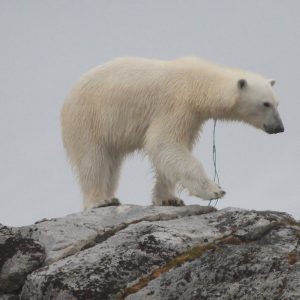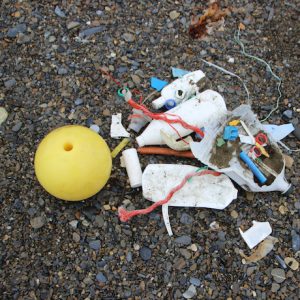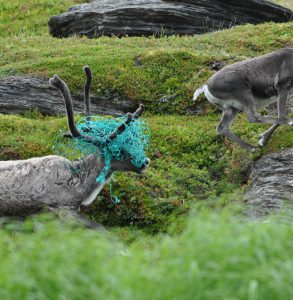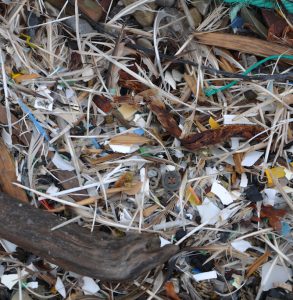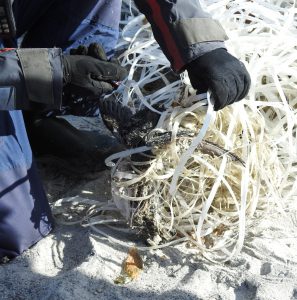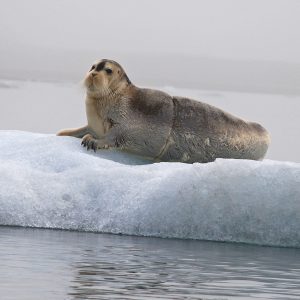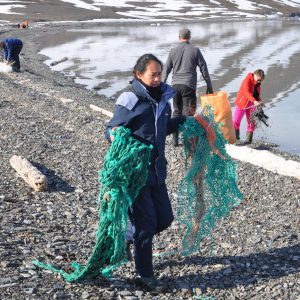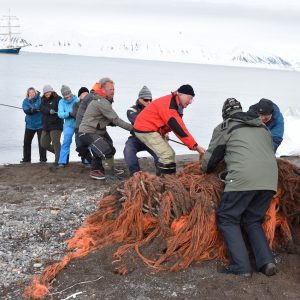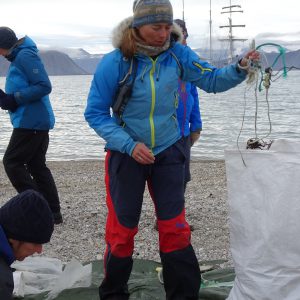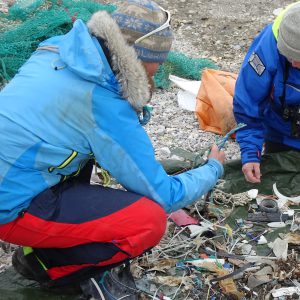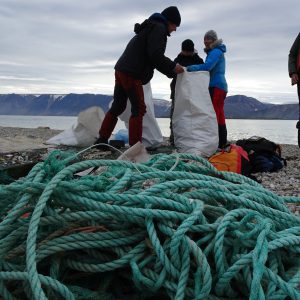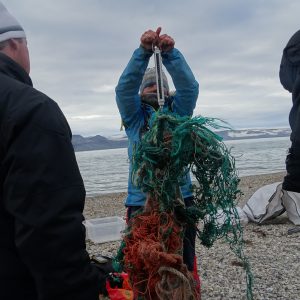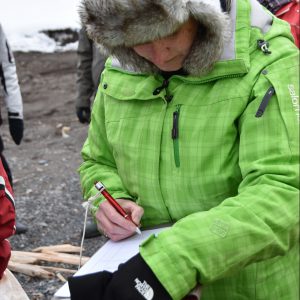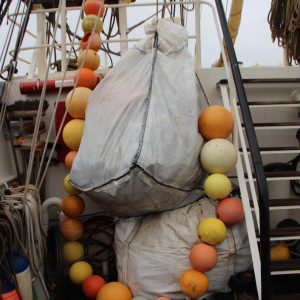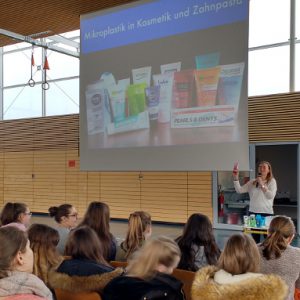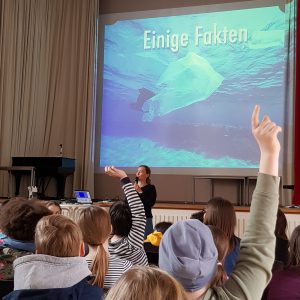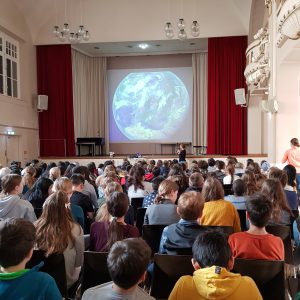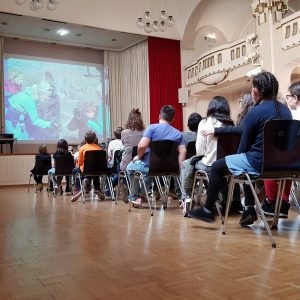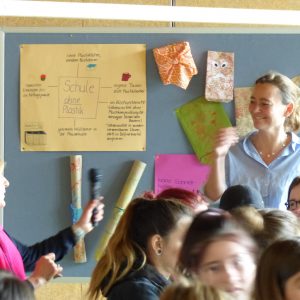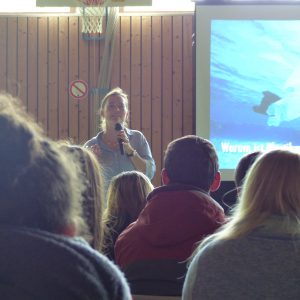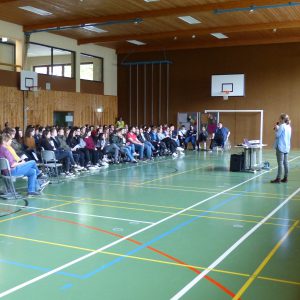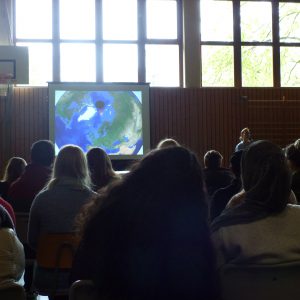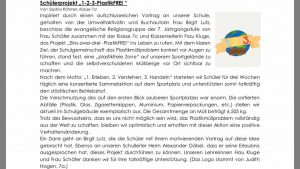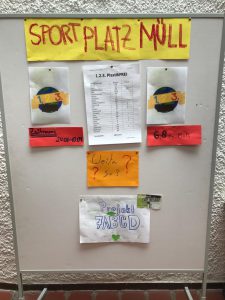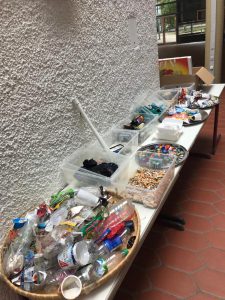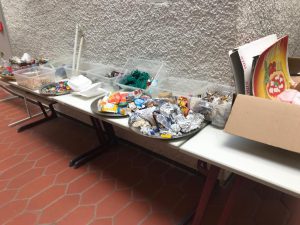Beach cleaning in Spitsbergen – Project and lectures
The net lay far inland. From a distance we could not tell what it was at first – something green and white, far away from the beach. As we got closer, we realized it was a fishing net, in a place where it never should belong.The white objects held in the net were 13 reindeer antlers. At least seven reindeer must have become entangled in the net and died in its grasp. As we stood in the wind and took in this sight, not one of us said a word.
This is familiar scene for anybody who works in Spitsbergen. We observe polar bears with nets around their neck, seals with ropes around their growing body. We carry out man-overboard manoeuvres with plastic islands in the sea. We collect barbie-doll horses, lighters, earbuds, shoes, plastic bottles, plastic caps, toothpaste tubes, jerry cans, crates, syringes, plastic crows, water cookers, helmets, rubber gloves and deodorant cans. We see Spitsbergen in all its glory. And then we see all the garbage.
Scientific project with the Alfred Wegener Institute for Polar and Marine Research
In 2015 I was standing on the garbage-strewn Sorvika beach on Nordaustlandet, and I made a decision: I wanted to do more. I contacted the Alfred Wegener Institute for Polar and Marine Research in Bremerhaven. There, the scientists Melanie Bergmann (PhD ) and Lars Gutow (PhD ) are studying the effects of anthropogenic marine litter. Together we established a Citizen Science Project – a project in which laypeople help to collect valid data for the purpose of scientific study.
Today, when I am guiding tourists around Spitsbergen on ships, our team tries to carry out one scientific collection per trip. We measure a certain area on the beach, collect all the garbage on it and categorise it. Then we weigh the categories and count every single piece of rubbish. This project has a deep impact, and leaves a lasting impression on our guests.
In the meantime, we have issued a scientific report publishing our results in the Marine Pollution Bulletin. The German news magazine Spiegel has reported about it, as well as various radio and TV stations and even the New York Times.
Lectures at schools and in public
While working on the ships, I realised how much interest my lectures created among the guests. This is why I have started to also give on-land talks about plastic marine pollution, about our citizen science project and possible alternatives to plastic. In 2015 I was still quite a rarity with this topic. Awareness of this problem has grown considerably since then.
Today I get invited all around Germany to speak about my experiences in Spitsbergen and about the influence we can have on marine pollution. I regularly give lectures in schools to students starting from 5th grade. I talk to them about what we observe and what the beaches look like in Spitsbergen. I talk to them about what ingredients are really contained in their glittering shower gels. I talk to them about why it makes a difference whether they give back their apple juice bottle, throw it in a field, or use their own refillable bottle instead.
Are you interested in one of my lectures?
Contact me here!
What I hope to convey is a message of endeavour, a sense of setting out for new lands, rather than paint apocalyptic scenarios and tell tales of doom. We can do better! We do not have to return to living in caves for it and we do not have to start cooking our own soap ourselves. We do not have to renounce on everything or consume only with a guilty conscience.
Plastic is not the problem. The problem is, what we are doing with it. (Erik Solheim, Head of UN Environment Programme)
What we need in some areas is indeed a return to the good old things. But much more – we need innovation. Smart products that use fewer resources and contain fewer toxics. Intelligent solutions. A plastic cup with a little less plastic is not an intelligent solution. We need products that are worthy of the knowledge of 2019, we need to stop repeating old mistakes. The innovator who searches for such solutions will make a lot of money in the future, and will create new jobs for many.
Reactions after some of my lectures about plastic
At the Gabriel-von-Seidl Gymnasium in Bad Tölz, some of the students set up their own project after my talk: They focussed on making their classmates aware of the amount of rubbish that is thrown away on their sports field. For three weeks, the students collected and counted the garbage. This project was a great thrill for me!
Christophorus-Schule Berchtesgaden (Lisa, 5th Grade)
It really upset me to see the dead animals. Right after that I told my dad when we were shopping that he should not take a plastic bag!
Christophorus-Schule Berchtesgaden (Emma, 5th Grade)
I found the lecture really good, because some of us are only now starting to wake up and starting to think!
Gabriel von Seidl Gymnasium, Bad Tölz (Teacher)
Because Birgit Lutz shows the beauty and priceless treasures of this earth, the lecture really shakes the audience up to actively take part in an effort to stem the plastic flood. It presents the plastic issue to the students in an impressive and very graphic manner. Every student (but also older ones!) should see this lecture!
Otto Hahn Gymnasium Marktredwitz (Teacher)
Birgit Lutz´ lecture was highly informative and a real wake-up call. The design of the presentation was well thought through – first the presentation of the “perfect world”, then the hard reality. The tips at the end are very useful and also the appeals to the students are very good.
Otto-Hahn-Gymnasium Marktredwitz (Student, 11th Grade)
The lecture was very interesting and enlightening because she was simply able to speak from her personal experiences. Through the numerous pictures and precise facts and figures I first became really aware of the magnitude of the issue. I think such lectures should be given to all grades at school.
Otto-Hahn-Gymnasium Marktredwitz (Student, 11th Grade)
The lecture was very interesting and you could really listen to what she had to say without getting bored.
Otto-Hahn-Gymnasium Marktredwitz (Student, 11th Grade)
The lecture was interesting because it explained a lot that I did not know yet. The illustration with pictures and videos was very good.
Otto-Hahn-Gymnasium Marktredwitz (Student, 11th Grade)
I liked the fact that she showed both the good and bad sides, and that she is really committed to this cause. With some of the suggestions I was not sure if they would help so much, but most of what she said was interesting and important.
Otto-Hahn-Gymnasium Marktredwitz (Student, 11th Grade)
I found the lecture very interesting, especially because she showed us the good and the bad sides of Spitsbergen. I found it shocking, how much plastic is already in the ocean. Thanks to this lecture I look better after my environment, and the App Code Check helps me with it. Such lectures should be given more often, because people have to know about all this, otherwise our future does not look good. I think she presented it very lively. I could learn a lot of it.
Rapunzel Naturkost (Management)
This is how we want a speaker to be: Birgit Lutz reached her audience with friendliness and authenticity. Not only did she elucidate the issues with her clear analysis, but also provided a series of encouraging tips. Her call to action: Start with something! This is exactly what we want to convey in our event programme. Because each and every one of us can do something!
Willibald-Gluck-Gymnasium, Neumarkt (Student, 11th Grade)
I found your lecture on plastic waste in the sea very interesting because you talked about your own experiences and work in Spitsbergen and showed pictures and films that you took yourself.
Willibald-Gluck-Gymnasium, Neumarkt (Student, 11th Grade)
I thought it was very good that you had so many pictures and videos with you, because you could imagine everything as it really is. The short part about the facts really opened your eyes but was not too long, so you didn’t get bored. The fact that you took most of the photos yourself, that you knew a lot and really got a personal idea of the problem and tried to do something about it made the talk exciting and authentic.
Willibald-Gluck-Gymnasium, Neumarkt (Student, 11th Grade)
I think the lecture is highly recommendable because it generally informs you about the pollution of the earth and really opens your eyes. The information was well conveyed, which kept us interested as we followed her every word.
Willibald-Gluck-Gymnasium, Neumarkt (Student, 11th Grade)
I found the lecture interesting, because although we already knew how much garbage is in the sea, the statistics, the astronomical figures were truly quite shocking. I also thought it was good that you showed us some pictures of animals eating garbage around with plastic around their neck.
Luisengymnasium Düsseldorf (Binh, 6thGrade)
Dear Mrs Lutz, I found your lecture very informative and I found it nice that you showed us all the plastic that is lying on the beaches. Now we really can see the reason for consuming less plastic, and we know that we are doing something good for the environment when we use less. Thank you, Binh.
Luisengymnasium Düsseldorf (Maurice, 6th Grade)
Dear Mrs Lutz, your lecture was very interesting, especially that you and your guests clean the beaches again and again. It was great that you showed us how it looks in other places, and what we can do about it. It is also really fun to go into shops and use the app Code Check you showed us and to check if products are eco-friendly or not. But there are many more non eco-friendly ones. I now take better care about what I buy and use, so I try to buy more products in glass or wood. Good luck on your way! Kind regards, Maurice
Luisengymnasium Düsseldorf (Zehra, 6th Grade)
Dear Mrs Lutz, I was very impressed that you walked so far, and all on foot. I would not make it if I had to walk so far in this cold. And I think it is great you cleaned all those beaches. One should really have respect for you.
Luisengymnasium Düsseldorf (Ecem, 6th Grade)
Dear Mrs Lutz, your pictures and videos were very interesting. The explanations are very useful because it is good to know what is happening with and in the environment. Yours, Ecem.
Mittelschule Schliersee (Teacher)
The lecture on environmental pollution in remote areas such as the shores of Spitsbergen truly impressed the students of the middle school. Even though the subject was already well-known in the classroom, it is more tangible and emotionally appealing when the speaker reflects her own personal experiences. The fact that the students showered Birgit Lutz with question shows how much interest she was able to arouse in them.

